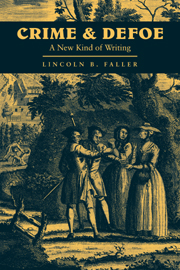Book contents
- Frontmatter
- Contents
- Preface
- List of abbreviations
- 1 Romancing the real: the “field” of criminal biography
- 2 Defoe's realism: rough frames, strange voices, surprisingly various subjects and readers made more present to themselves
- 3 The copious text: opening the door to inference, or, room for those who know how to read it
- 4 Intimations of an invisible hand: the mind exercised, enlarged, and kept in play by strange concurrences
- 5 The general scandal upon business: unanswerable doubts, and the text as a field supporting very nice distinctions
- 6 The frontiers of dishonesty, the addition and concurrence of circumstances: more on the strategic situating of names
- 7 Notions different from all the world: criminal stupidity, the self, and the symbolic order
- Closing comments: truth, complexity, common sense, and empty spaces
- Index
3 - The copious text: opening the door to inference, or, room for those who know how to read it
Published online by Cambridge University Press: 14 September 2009
- Frontmatter
- Contents
- Preface
- List of abbreviations
- 1 Romancing the real: the “field” of criminal biography
- 2 Defoe's realism: rough frames, strange voices, surprisingly various subjects and readers made more present to themselves
- 3 The copious text: opening the door to inference, or, room for those who know how to read it
- 4 Intimations of an invisible hand: the mind exercised, enlarged, and kept in play by strange concurrences
- 5 The general scandal upon business: unanswerable doubts, and the text as a field supporting very nice distinctions
- 6 The frontiers of dishonesty, the addition and concurrence of circumstances: more on the strategic situating of names
- 7 Notions different from all the world: criminal stupidity, the self, and the symbolic order
- Closing comments: truth, complexity, common sense, and empty spaces
- Index
Summary
The Brother argued, That, as the End and Use of every Fable was in the Moral, so a Fiction, or what they call'd a Romance, told only with Design to deceive the Reader … that the Fact related was true must be … criminal and wicked, and making a Lye …. But on the contrary, when the Moral of the Tale is duly annex'd, and the End directed right … Fables, feigned Histories, invented Tales, and even such as we call Romances, have always been allow'd as the most pungent Way of writing or speaking; the most apt to make Impressions on the Mind, and open the Door to the just Inferences and Improvement which was to be made of them.
Defoe, A New Family Instructor (1727), pp. 51–3The pretended Abridgement of this Book … consists only of some scatter'd Passages incoherently tacked together; wherein the Author's Sense throughout is wholly mistaken, the Matters of Fact misrepresented, and the Moral Reflections misapplied.
Advertisement for Robinson Crusoe, the Daily Courant and Applebee's Original Weekly Journal, 8 August 1719This work is chiefly recommended to those who know how to Read it, and how to make the good Uses of it, which the Story all along recommends to them … it is to be hop'd that such Readers will be much more pleas'd with the Moral, than the Fable; with the Application, than the Relation, and with the End of the Writer, than with the Life of the Person written of.
Preface to Moll Flanders, p. 2- Type
- Chapter
- Information
- Crime and DefoeA New Kind of Writing, pp. 76 - 109Publisher: Cambridge University PressPrint publication year: 1993



